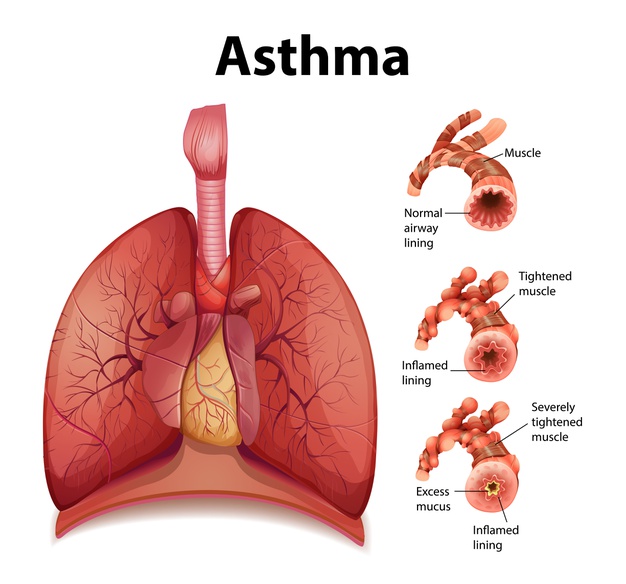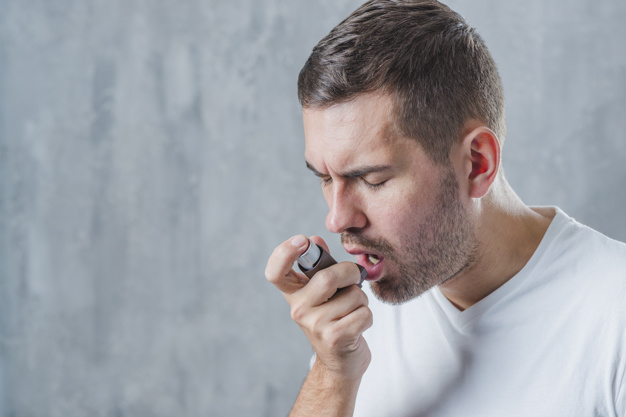
During the night, many asthma sufferers may experience bad asthmatic symptoms, even worse than during the day. Known as nocturnal or nighttime asthma, just under half of those with asthma say that for at least one day per week they find it difficult getting or staying asleep due to their symptoms. No one quite knows the exact cause of why the night prompts such severity of reactions, but there are a number of factors that are likely to be at play here. This article will explore these possible triggers, determine how best to prevent them, and give you some tips on quickly relieving symptoms when they do occur.
What is Asthma?

Asthma is a common condition of the lungs affecting the airways. It causes the airways to narrow in sufferers, producing more mucus than on average, and restricting easy airflow. The condition is unfortunately long-term, although typically first develops and is worst during childhood and adolescence. When the airways become inflamed, a number of symptoms can occur in varying severities, such as shortness of breath, coughing and wheezing, and bronchospasms. Whilst you can develop asthma at any point in your life without a genetic predisposition, a family history of allergies, including hay fever or eczema, will increase your chances of having symptoms. Other factors can increase the likelihood that you’ll have symptoms, such as if you were exposed to tobacco when you were a child, either directly or indirectly through your mother smoking during pregnancy. Usually, asthma is a condition that can be managed without too many serious issues, due to convenient reliever inhalers, however, the onset of sudden symptoms sometimes referred to as asthma “attack”, can be scary and uncomfortable, and even fatal if you don’t have an inhaler to hand. In the UK, for example, 3 people die every single day from asthma, which gives you a sense of how serious the condition can be, especially if left untreated.
How Does Nocturnal Asthma Differ?

As you may well have guessed, nocturnal asthma is the type of asthma that occurs whilst you’re asleep at night. In terms of what you can expect, this is largely similar to the daytime symptoms of coughing and breathlessness but they can be to a greater extent. Sometimes, having nighttime asthma can indicate your likelihood of having an asthma attack is greater. Despite the possibility of a serious asthma attack, one of the most difficult effects to deal with is sleep disruption, which will have a knock-on effect the following day and lead to irritability and tiredness, and generally worsen your quality of life. If towards the luckier end of the spectrum, you may find that you don’t wake up during the night, but if you’re short of breath or have a tightness in the chest on waking up then this might be an indication that you’ve been aggravated whilst you slept during the night.
What can cause Nocturnal Asthma?

Whilst it’s not totally clear why asthma often takes a turn for the worst during the night, doctors and healthcare specialists have identified a number of likely factors contributing to the condition.
- Hormonal
The production of different hormones ebbs and flows at different key points in our lives and in our bodily development, but they also differ within a 24 hour period. Our sleep cycle sometimes referred to as the circadian rhythm, contributes to regulating certain hormone production, such as epinephrine. This hormone relaxes the walls of the bronchial tubes meaning air can pass through the wide opening with ease, and epinephrine is at its lowest level during the night. Similarly, histamine, which encourages the production of mucus, is at its highest level at night. These 2 factors result in a naturally narrower airway at night, not usually an issue for healthy individuals but a risk for those with asthma.
- Mucus build-up and Sinusitis
As mentioned above, the increased amounts of mucus narrow the airways. Also, drainage of the sinuses can trigger asthma in sensitive airways.
- Allergens
Having low-quality air where you sleep is bound to aggravate asthma. As you’re in the same stationary position in the same room for around 8 hours every night, it’s worth considering which items in your immediate vicinity could cause a flare-up. Dust mites that live in your bedding can cause allergies, as can pet hair, mold or dampness, and pollen, especially in peak seasons.
- The Reclined Position
Laying flat down when asleep could actually make your symptoms worse, by increasing secretion build-up and decreasing lung volumes, so this should be avoided if severe.
- Acid Reflux
Acid reflux, known to cause heartburn, occurs when stomach acid enters the lower esophagus and can cause the airways to spasm and tighten. This could result in restrictive breathing, so make sure to treat your acid reflux, if that’s something you suffer from, to aid in preventing nocturnal asthma.
Relieving Measures

In an ideal world, we would be able to eradicate all possible triggers from our sleeping environment. Sadly, this is either too difficult or the factors themselves aren’t always under our control, so there will be times where you wake up in the night and need instant relief. Try some of the tips below:
- Make sure you’re in a raised position and not a horizontal position, as this is bad for symptoms. Sit upright slightly, and have your Ventolin reliever inhaler on hand by your bed, using this to relieve the symptoms. Use extra pillows to prop yourself up.
- Don’t go back to sleep immediately, so you can assess the severity of the attack before going back to sleep and possibly experiencing another case.
- Drink some water to soothe your throat if it’s dry.
- Nasal saline rinses may help, but for others, it can actually trigger symptoms. If you want to explore this route, trial the product during the day so you don’t get a nasty surprise during the night.
Preventative Measures

- Exercising frequently helps to build resilience in the lungs and makes taking breaths easier.
- Use a prescribed preventer inhaler every day.
- Humidity the air in your house, especially bedroom.
- Close your window during high pollen seasons, use a fan to keep cool instead.
- Don’t let your pet in your bedroom if they prompt your allergies.
- Relax during the final hours of the day, perhaps meditating to control and relax your breathing.
This article was written by Pharmica. Visit their website for more useful information on asthma, respiratory condition and a whole host of other areas of healthcare include approved treatments.












